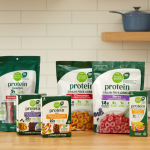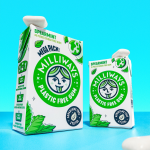How Chef Ming Tsai Plans to ‘Redefine’ the Hot Pocket with MingsBings
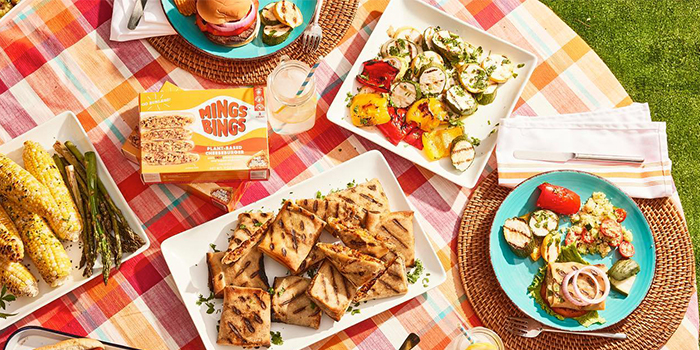
Chef Ming Tsai may be best known for his Emmy award-winning television program, high-end restaurants or even for landing on People’s 50 Most Beautiful People list, but now he wants to be known for something else: creating an affordable alternative to the Hot Pocket. And he’s on his way — roughly a year after launching his new CPG endeavor, MingsBings, Tsai’s plant-based, frozen bings are sold in five flavors at stores across the East Coast, and are now targeting national distribution.
Though perhaps not as well known to all American consumers as the Hot Pocket, a bing is similarly positioned as a convenient meal solution for busy consumers. The traditional Chinese wheat flour-based pancake, or flatbread, is often filled with, or wrapped around, vegetable or meat.
Tsai knows the American palate well. In addition to spending decades on television, first hosting Food Network’s East Meets West followed by PBS’ Simply Ming, he also owned and operated Massachusetts-based restaurants Blue Ginger (which closed in 2017) and Blue Dragon (which closed due to the Covid-19 pandemic). Though he has long wanted to launch a CPG line of products, Tsai said it was “serendipitous” to do so right before the pandemic’s devastating impact on the restaurant industry.
“It’s just so ironic to say, but because of the world pandemic, it slowed me down to be able to focus on starting a new company,” Tsai said. “As a chef, you do all these great things, which is part of the fun of being a chef, but you don’t stay focused. When you start a company you actually really need to be in front of a laptop and make thousands of phone calls.”
The move to launch the company came also after Tsai’s wife Polly was diagnosed with stage-four lung cancer in 2017 and switched to a plant-based diet. With Polly now in remission, Tsai decided he wanted to be home more, aborting plans to launch a fast casual restaurant chain in favor of pursuing the better work-life balance offered by his CPG venture.
After debuting as a direct-to-consumer product last March, MingsBings are now sold in over 200 retail locations on the East Coast including Wegmans, Roche Brothers, Dave’s Fresh Market, Alltown Fresh, Fairway Market and select Whole Food Markets and Market Baskets. The line has also expanded from the Original Veggie-Filled Bing to include a Buffalo Cauliflower Bing, a Plant-Based Sausage & Peppers Bing, a Fiesta Bing, and a plant-based Cheeseburger Bing — all riffs on classic Boston or Tsai dishes.
Sold frozen in two packs for $5.99, the Bings are gluten-free, dairy-free, tree-nut free and peanut-free. Plant-based meats in the products are supplied by producer Uncut.
To support the company’s launch, last year Tsai brought on Stephen Osipow (formerly of Ahold and investment group Heritage Holdings) as CEO and Ashley Christensen (formerly global marketing lead at Instagram) as CMO. Assembling the team, which now totals nine employees, was key to making sure MingsBings became a “real company” versus a “side hobby project,” he said.
“You have to spread that responsibility to incredibly key people,” Tsai said. “Who you work with, defines you, period. It doesn’t matter how smart you may be. If you don’t have people that believe passionately in your project, you’re done.”
MingsBings has also raised just over $2 million in funding from angels investors including the family office of Michael Meldman, Co-Founder of Casamigos. General Catalyst founder David Fialkow also privately invested in the company, with Tsai noting that if and when MingsBings ever goes public or sells, Fialkow has pledged to donate the proceeds from his share of the company to charity.
That mission-based focus runs throughout the brand, with proceeds from each sale going towards The Dana Farber Cancer Foundation as well as Family’s First, a charity that helps support cancer patients and their families.
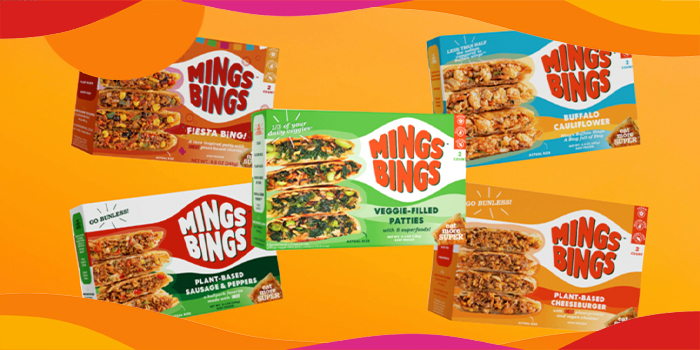
Now that the company has “gotten over the hurdle of cost of goods sold and production capacity,” Osipow said, the plan is to focus on distribution and add retailers across the country.
His “dream,” however, is to launch the line into the convenience channel, and the team is currently working on a single-serve option that could be sold alongside frozen burritos. Osipow and Tsai acknowledged they’ll also need to improve cooking times on the Bings to make this channel a better fit. Currently the bings take 16 minutes to cook in an air fryer, toaster oven or skillet, but a new version debuting later this year will utilize a combination of microwave cooking, followed by one minute in a toaster oven. Tsai said he’s also working to develop a lower-cost version of the Turbo Chef, a microwave-meets-air fryer used by restaurants. While not directly associated with MingsBings, it’s a launch that he believes will further support product adoption.
The team also plans to invest heavily into the food service channel. A key selling point of the bings, Tsai says, is that the gluten-free wrapper can remain crispy for an hour after cooking if kept under heat lamps. Currently MingsBings are sold hot in baseball stadium Fenway Park and at retailer Roche Brothers, and the company is in talks with other sports venues and QSR chains as well.
While production at the company’s Massachusetts-based co-packer has been streamlined in the past year, the bings are still made by hand. The plan, Osipow said, is to further invest in production equipment to improve automation and to bring additional co-packing partners onlineas the company expands its reach.
Given Tsai’s culinary background, the brand sees a long runway ahead for potential innovation. Breakfast bings with plant-based eggs and dessert bings are all under consideration, while MingsBings dipping sauces are set to launch later this year. Beyond the condiments, the company plans to focus on frozen with possible line expansions into bite-sized Bing Bites and possibly, in a few years, Bing Bowls.
To fuel that growth, the company plans to close its “last and final” round of capital later this year, after which Tsai said it should be profitable and can support itself. However, even after adding more investors, Tsai and Osipow emphasized that the company will be centered around accessibility.
“Right now, though, the single mom and single dad that has $20 and three kids, they have to go to McDonald’s. They have no choice… they don’t have a pan, they don’t have the time, they have three jobs — So they go to fast food,” Tsai said. “It’s economics: If it’s $14 a Bing, then you’re never gonna sell them anywhere, but if it’s the same price as a Big Mac, well, then you can sell them. And if it’s convenient to pick up like a Big Mac, then you’re really on to something.”
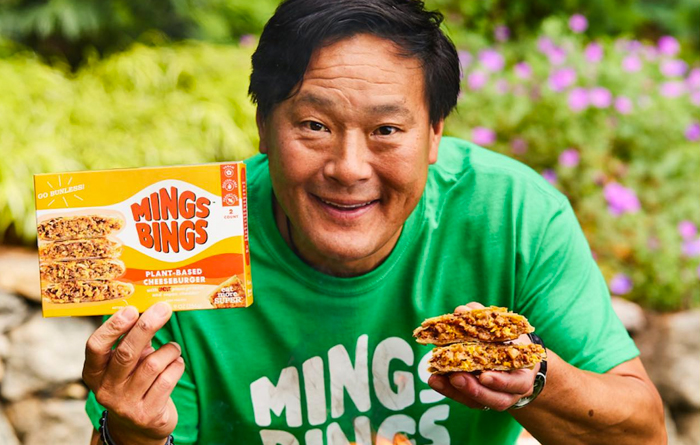
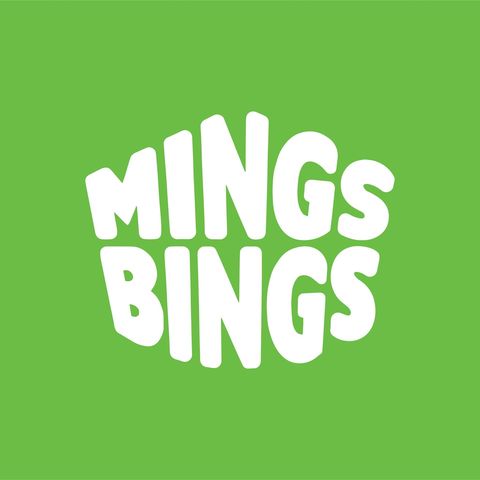
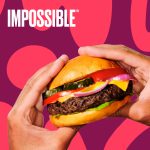







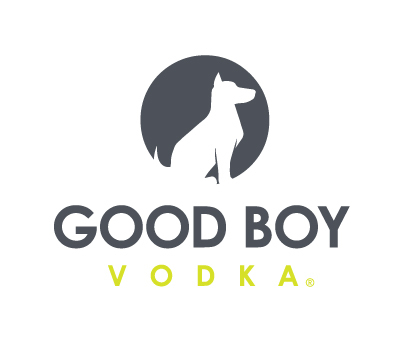





![[Updated] Oats Overnights Secures $45M Investment From Astō](https://d2azl42aua8mom.cloudfront.net/wp-content/uploads/2026/01/29172259/2026-01-29-oats-overnights-secures-45m-in-growth-equity-from-square-150x150.jpg)
